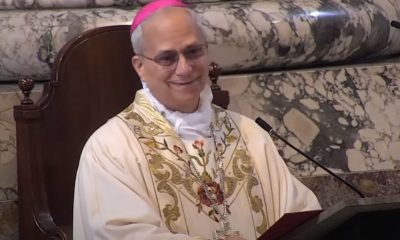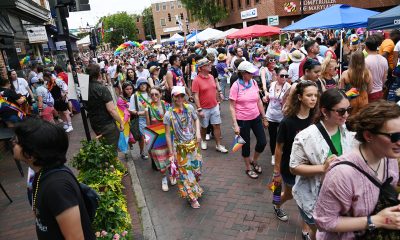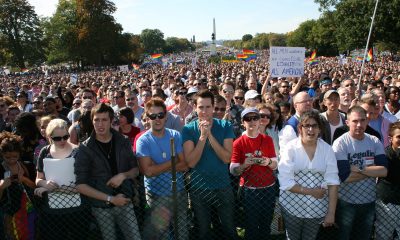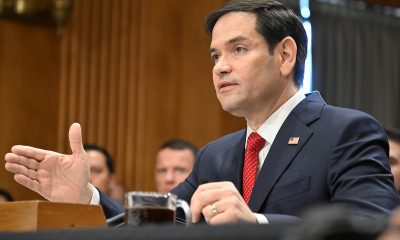THE MAGIC TOUCH
Opinions
My chance encounter with a pope and why goodness still matters
Early morning Vatican stroll turns into unforgettable memory
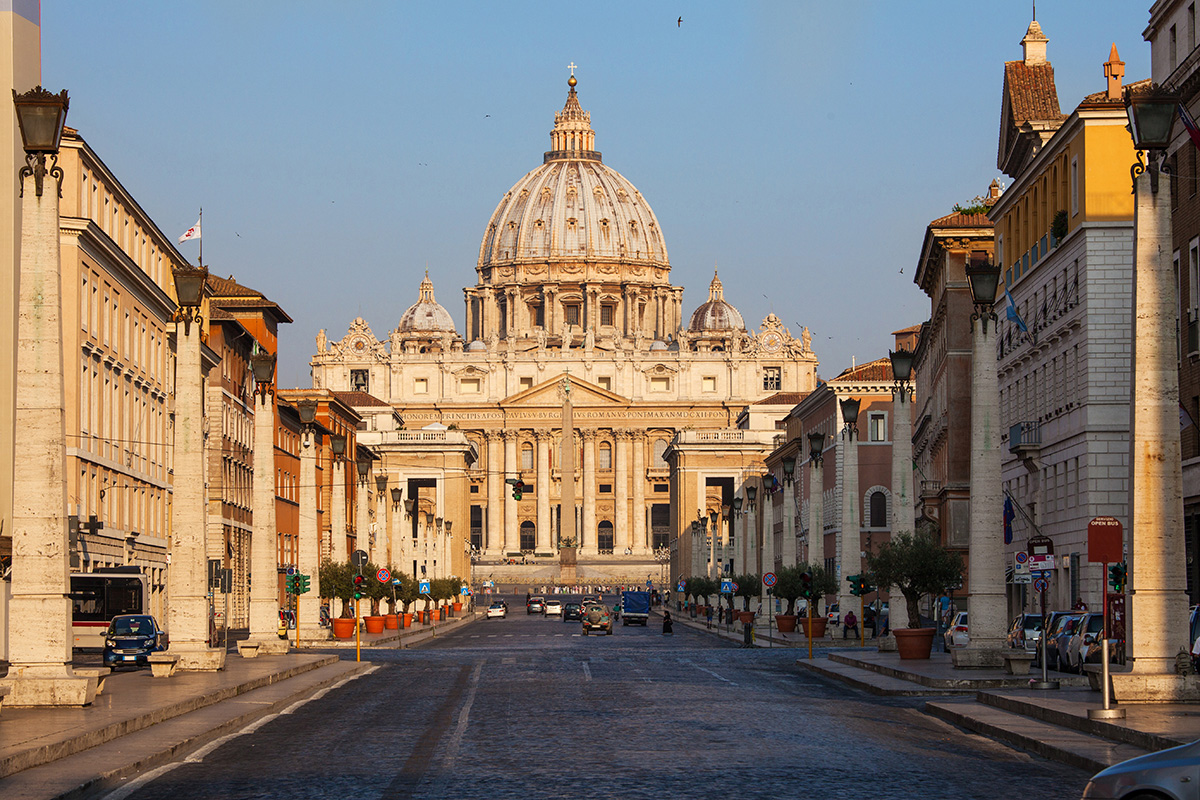
It’s not every day you meet a pope. Mine was Pope John Paul. In the recent passing of Pope Francis, and all the love and generosity of this ”People’s Pope,” I was reminded of a similar man, with a similar heart, who I had the fortune to one day meet.
There’s no real yardstick for measuring a man who’s the head of an institution that has been around since the Romans, who commands the respect of more than a billion people, and whose job it is to keep alive a 2,000-year-old message of love, hope, generosity, and salvation.
I wasn’t planning on meeting him. More like it was fated, or I’d like to believe that.
I was on a spiritual journey of my own. My schoolwork was over in Norway, and I was headed to Lebanon to write about the war there. I was a young man of 17, trying to figure out the world and how it worked — or didn’t.
It was a week before Easter when I found myself in Rome, standing at the far edge of St. Peter’s Square. As I remember, it was very early and a very beautiful morning, sometime around six or so. Even at that age, I found great solace in the solitude of the early morning. It’s as if I had the entire Square to myself, reflecting on this singular moment in time that I was alone in one of the greatest places of spiritual gathering in the world.
But I wasn’t alone. Next to the fountain where I had parked my backpack laid a man, curled up next to the stone wall, in the gentle universal snore of inebriation. I quietly cupped some water to wash my face and neck, which apparently was enough to stir the man from his sleep.
I nodded my head at him, smiled, and gave a short wave in the universal sign that we were all good and passing fellows. He groggily waved back. I was about to gather up my rucksack and head out when I saw a man strolling across the far side of the Square, about 100 yards away He was in no hurry, which intrigued me. Another soul in search of morning quietude, I thought to myself. He sauntered along, thoroughly enjoying the morning air, occasionally looking up at the sky, which was equally as intriguing.
He was a happy man who was happy to be alive. I thought it was remarkable that on that morning, there were two happy people in the world, and they were both in St. Peter’s Square.
As if a bee to a flower, the man took a direction to a small group of people, three or four more souls walking together who stopped as the man approached them. I saw one of them reach out for the man’s hand and then he kissed it. Now my curiosity turned to wonderment, trying to understand what was taking place.
My Roman fountain friend began a slow drunken babble to me as he gestured toward the small cluster that I was evidently staring at. His Italian was as good as my English, and that was the end of it. Though he continued to say, “Papa, Papa.” I queried him back, having no clue what his Papa was. Then he sat up as if to collect every ounce of clarity that still inhabited him and said, “Pope-a.” I pointed to the group. “The Pope?” He nodded his head and said, “Si. Il Pope-a” (which I later understood was a combination of the affectionate and respectful use of Papa for the Pope, combined with our English version — thus, “Pope-a”).
He smiled. I smiled. The apostle of the fountain had conveyed his message, and I was on my way to meet the pope.
Quickly, I made my way to the small gathering. I was a little unsure of how to add myself to the procession, as small as it was. My mind started to whirl with pope-laden imaginings. Would he be talking in Latin? Wearing silk robes? Would he be holding some relic of St. Peter’s golden staff?
I then slowed my walk, brought myself to the edge of the group, and there he was — the pope, John Paul himself. He was smaller than I had imagined. No staff or silk robes. He was chatting up the small group as if they were neighbors meeting in the middle of the sidewalk, exchanging news of the neighborhood or the latest sport’s scores, all in a breezy mixture of Italian and English.
He then spotted me and waved me over. I froze for a moment. With no time to study the Pope Manual of Papal Etiquettecy, I had no clue if I should kiss the ring or the hand, or shake it, or what? Not being Catholic, I was not versed on how to properly greet a pope.
I then did what any non-Catholic American 17-year-old kid on a spiritual journey would do: I combined a handshake with a nod/kiss on the hand and the biggest kid-smile I could muster. He smiled back, with the understanding of what it was to be a pope and meet a kid like me both in awe and in happiness at being together there on the Sunday morning in St. Peter’s Square.
He asked me a few questions for which I have no memory of my answers. It didn’t matter. I was talking with the pope.
There was no Instagram, or Facebook, or selfie-taking back then. Everyone somehow understood that this was a moment you stored in your mind and in your heart. To take pictures would have somehow sullied it, and everyone knew it.
John Paul was a man on a morning stroll, who shared his intimate time with a group of fellow morning seekers. He was warm, kind, and cordial — a prince of a fellow in my book. The type of man you could talk to in a bar, or on a train, or on a park bench. He practiced the generosity that is the best of the human spirit — to give without expecting anything in return. A gift of love that needs no bartering or transaction to fulfill it.
Lately, and with the recent passing of Pope Francis, I thought I needed to commemorate this memory of this day on paper. Watching how generous Pope Francis was with his love, to the children, to the sick and poor, to the downtrodden, to those who are so easily trampled over in the modern day haste to make civilization “better” and “faster,” it was no stretch to remember another man who so equally and mightily gave his heart and soul to others.
In a world where so many are seemingly trying to figure out who to hate and how to hate them, I find great solace in knowing that there are those who understand that the better angels of our nature are to be better.
On a beautiful Sunday morning, in the small tide of the oceans of history, I met with a man who helped me to remember once again that the Golden Rule is golden because it shines with goodness, grace, and generosity, and that is no small endeavor for all of us to journey toward in all of our lives.
Carew Papritz is the award-winning author of ‘The Legacy Letters’ who inspires kids to read through his ‘I Love to Read’ and ‘First-Ever Book Signing’ YouTube series.
Music & Concerts
Underdog glorious: a personal remembrance of Jill Sobule
Talented singer, songwriter died in house fire on May 1
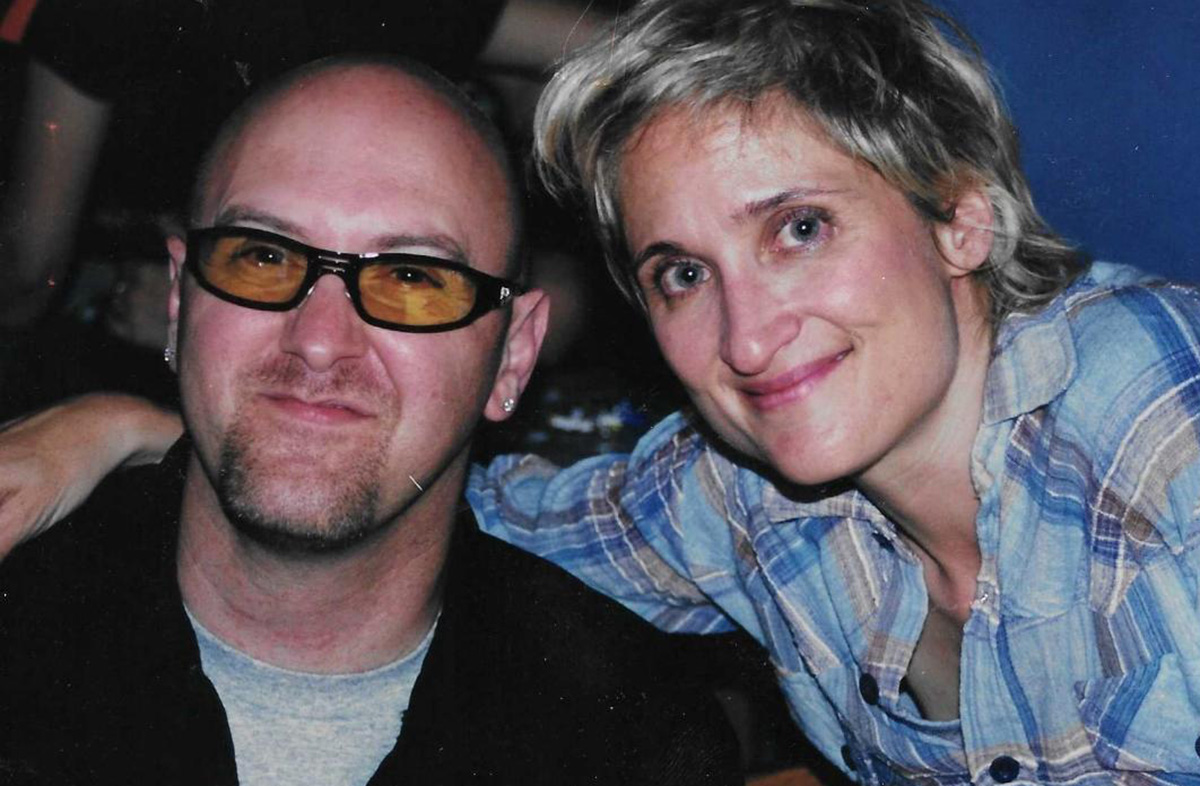
I’ve always prided myself on being the kind of music consumer who purchased music on impulse. When I stumbled across “Things Here Are Different,” Jill Sobule’s 1990 MCA Records debut album on vinyl in a favorite Chicago record store, I bought it without knowing anything about her. This was at a time when we didn’t have our phones in our pockets to search for information about the artist on the internet. The LP stayed in my collection until, as vinyl was falling out of fashion, I replaced it with a CD a few years later.
Early in my career as an entertainment journalist, I received a promo copy of Jill’s eponymous 1995 Atlantic Records album. That year, Atlantic Records was one of the labels at the forefront of signing and heavily promoting queer artists, including Melissa Ferrick and Extra Fancy, and its roster included the self-titled album by Jill. It was a smart move, as the single “I Kissed A Girl” became a hit on radio and its accompanying video (featuring Fabio!) was in heavy rotation on MTV (when they still played videos).
Unfortunately for Jill, she was a victim of record label missteps. When 1997’s wonderful “Happy Town” failed to repeat the success, Atlantic dumped her. That was Atlantic’s loss, because her next album, the superb “Pink Pearl” contained “Heroes” and “Mexican Wrestler,” two of her most beloved songs. Sadly, Beyond Music, the label that released that album ceased to exist after just a few years. To her credit, the savvy Jill had also started independently releasing music (2004’s “The Folk Years”). That was a smart move because her next major-label release, the brilliant “Underdog Victorious” on Artemis Records, met a similar fate when that label folded.
With her 2009 album “California Years,” Jill launched her own indie label, Pinko Records, on which she would release two more outstanding full-length discs, 2014’s “Dottie’s Charms” (on which she collaborated with some of her favorite writers, including David Hadju, Rick Moody, Mary Jo Salter, and Jonathan Lethem), and 2018’s stunning “Nostalgia Kills.” Jill’s cover of the late Warren Zevon’s “Don’t Let Us Get Sick” on “Nostalgia Kills” was particularly poignant as she had toured with him as an opening act.
Jill was a road warrior, constantly on tour, and her live shows were something to behold. My first interview with Jill took place at the Double Door in Chicago in early August of 1995, when she was the opening act for legendary punk band X. She had thrown her back out the previous day and was diagnosed with a herniated disc. To be comfortable, she was lying down on a fabulous-‘50s sofa. “I feel like I’m at my shrink’s,” she said to me, “Do you want me to talk about my mother?”
That sense of humor, which permeated and enriched her music, was one of many reasons to love Jill. I was privileged to interview her for seven of her albums. Everything you would want to know about her was right there in her honest lyrics, in which she balanced her distinctive brand of humor with serious subject matter. Drawing on her life experiences in songs such as “Bitter,” “Underachiever,” “One of These Days,” “Freshman,” “Jetpack,” “Nothing To Prove,” “Forbidden Thoughts of Youth,” “Island of Lost Things,” “Where Do I Begin,” “Almost Great,” and “Big Shoes,” made her songs as personal as they were universal, elicited genuine affection and concern from her devoted fans.
While she was a consummate songwriter, Jill also felt equally comfortable covering songs made famous by others, including “Just A Little Lovin’” (on the 2000 Dusty Springfield tribute album “Forever Dusty”) and “Stoned Soul Picnic” (from the 1997 Laura Nyro tribute album “Time and Love”). Jill also didn’t shy away from political subject matter in her music with “Resistance Song,” “Soldiers of Christ,” “Attic,” “Heroes,” “Under the Disco Ball,” and the incredible “America Back” as prime examples.
Here’s something else worth mentioning about Jill. She was known for collaboration skills. As a songwriter, she maintained a multi-year creative partnership with Robin Eaton (“I Kissed A Girl” and many others), as well as Richard Barone, the gay frontman of the renowned band The Bongos. Jill’s history with Barone includes performing together at a queer Octoberfest event in Chicago in 1996. Writer and comedian Julie Sweeney, of “SNL” and “Work in Progress” fame was another Chicago collaborator with Sobule (Sweeney lives in a Chicago suburb), where they frequently performed their delightful “The Jill and Julia Show.” John Doe, of the aforementioned band X, also collaborated with Jill in the studio (“Tomorrow Is Breaking” from “Nostalgia Kills”), as well as in live performances.
On a very personal note, in 2019, when I was in the process of arranging a reading at the fabulous NYC gay bookstore Bureau of General Services – Queer Division, I reached out to Jill and asked her if she would like to be on the bill with me. We alternated performing; I would read a couple of poems, and Jill would sing a couple of songs. She even set one of my poems to music, on the spot.
Jill had an abundance of talent, and when she turned her attention to musical theater, it paid off in a big way. Her stage musical “F*ck 7th Grade,” a theatrical piece that seemed like the next logical step in her career, had its premiere at Pittsburgh’s City Theatre in the fall of 2020, during the height of the pandemic. The unique staging (an outdoor drive-in stage at which audience members watched from their cars) was truly inspired. “F*ck 7th Grade” went on to become a New York Times Critic’s pick, as well as earning a Drama Desk nomination.
In honor of the 30th anniversary of Jill’s eponymous 1995 album, reissue label Rhino Records is re-releasing it on red vinyl. Jill and I had been emailing each other to arrange a time for an interview. We even had a date on the books for the third week of May.
When she died in a house fire in Minnesota on May 1 at age 66, Jill received mentions on network and cable news shows. She was showered with attention from major news outlets, including obits in the New York Times and Rolling Stone (but not Pitchfork, who couldn’t be bothered to review her music when she was alive). Is it wrong to think that if she’d gotten this much attention when she was alive she could have been as big as Taylor Swift? I don’t think so.
District of Columbia
Dr. Fauci receives Harvey Milk Award, reflects on legacy of love and public health
The legendary public health leader was honored by a D.C. LGBTQ synagogue for his lifetime of compassionate service and advocacy.
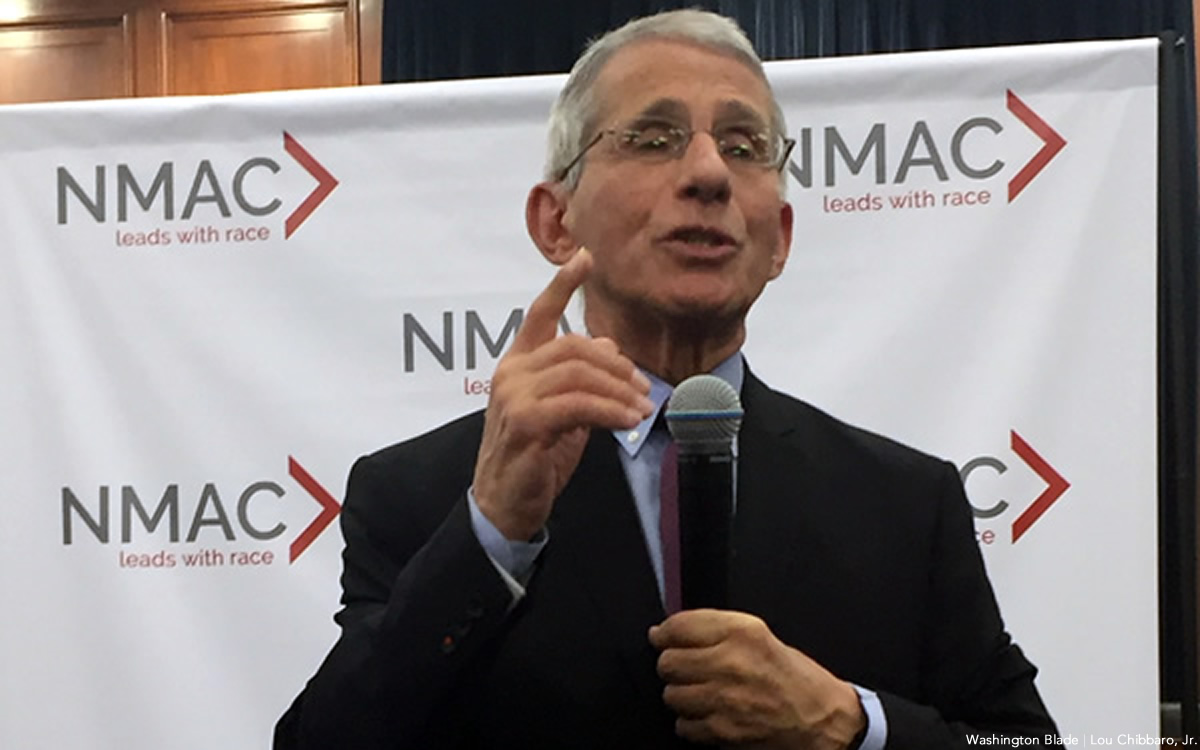
A buzz of anticipation filled Cafritz Hall on Wednesday evening. Though a few seats remained empty, the atmosphere suggested a pop star might be moments from taking the stage. But the spotlight wasn’t reserved for a chart-topping performer—it was focused on a different kind of icon.
Dr. Anthony Fauci, the former director of the National Institute of Allergy and Infectious Diseases (NIAID), stepped forward to receive the Harvey Milk Chesed Award—an honor recognizing compassion, courage, and a lifetime of public service.
The Harvey Milk Chesed Award was established by Bet Mishpachah in 1998 in honor of civil rights leader Harvey Milk. Milk, a member of the San Francisco Board of Supervisors and one of the first openly gay elected officials in the United States, was assassinated in 1978 following his public advocacy for LGBTQ rights. Bet Mishpachah gives out the award annually to an individual who has made “outstanding contributions to the LGBTQ+ and Jewish communities that exemplify the virtue of chesed, or ‘lovingkindness.’”
The program began promptly at 7 p.m. at Bet Mishpachah, Washington’s LGBTQ egalitarian synagogue, and featured a diverse lineup of speakers, including rabbis, physicians, professors, synagogue members, and past recipients of the Harvey Milk Chesed Award. While each speaker highlighted different facets of Dr. Fauci’s career – from his leadership during public health crises to his engagement with Jewish and LGBTQ communities- a unifying theme emerged: his unwavering commitment to doing what’s right, even in the face of political opposition, including from presidents.
Fauci, who was director of the NIAID from 1984 to 2022, was at the forefront of understanding and combating some of the deadliest diseases known to humanity, including tuberculosis, Zika, and HIV/AIDS. As the HIV/AIDS epidemic escalated and frustration with federal inaction mounted, Fauci took an unconventional step for a high-ranking public health official: He began engaging directly with the activists demanding change. That simple act of listening, he later explained, shaped his understanding of what patients truly needed — even when it meant defying the prevailing wisdom of the medical establishment.
“I developed long-term friendships with the activists,” Fauci said in a 2023 interview with PBS’ American Masters. “We were sort of like soldiers in the same war.”
This spirit of solidarity echoed throughout the night’s speakers, beginning with Barry Friedman, who delivered welcoming remarks to the crowd. Friedman began his introduction with a Hebrew phrase that, at first glance, might not seem to align with a man devoted to the rigor of medical science. But as he explained, it was a phrase Fauci exemplified.
“Lo tukhal l’hitaleim,” Friedman read from his notes, explaining that this message was hailed in his youth as the “11th commandment” by his mother. “You must not remain indifferent,” he translated.
Fauci, Friedman explained, remained steadfast in the principles of medicine while also showing deep compassion for those living with HIV and AIDS. He advocated for changes to drug trial protocols—convincing researchers to allow patients to “parallel track” experimental treatments, even when doing so went against past medical norms. This shift helped extend lives and alleviate symptoms in those most affected by the disease.
As the night continued, speaker after speaker reflected on the extraordinary achievements Fauci helped bring about—not just through scientific breakthroughs, but by listening to the people who were so often ignored. Fauci credited activists like Larry Kramer for ensuring the needs of HIV/AIDS patients could not be overlooked.
One of those speakers, Jeff Levi, an emeritus professor at the Milken Institute School of Public Health at George Washington University, former deputy director of the White House Office of National AIDS Policy, and a close friend of Fauci, led a panel discussion where the two expanded on stories from Fauci’s 2024 bestselling book “On Call: A Doctor’s Journey in Public Service.” During the panel, Fauci reflected on how his Jesuit Catholic upbringing helped shape a moral compass that transcended religious, cultural, and political boundaries in his public health work, and how he was able to navigate such a difficult time in medical history.
While it’s nearly impossible to calculate how many lives Fauci has helped save, the numbers point to an extraordinary legacy. Millions of LGBTQ people owe their survival in part to his efforts to understand how HIV spread, how it progressed, and how its symptoms could be mitigated. In addition, more than 25 million people worldwide- mostly in sub-Saharan Africa- have benefited from PEPFAR, the President’s Emergency Plan for AIDS Relief, which Fauci played a key role in creating.
Following the panel, Fauci took questions from the audience, reflecting on both his legacy and the enduring power of public advocacy.
“The gay community wasn’t afraid to speak up in the 1980s,” he told one audience member, who asked about the parallels between HIV/AIDS and the COVID-19 pandemic, and what people could do now to offset some of the… less than factual ‘information’ being presented as truth from the Trump administration. “And we can’t be afraid to speak up now.”
When asked what message he hopes young LGBTQ doctors will take from his life’s work, Fauci paused, then offered a heartfelt answer. “I don’t want to sound too melodramatic, but we need to love each other.”
As the crowd filtered out of the hall and only a handful of Fauci admirers lingered in line for a signed book, the Blade caught up with the evening’s honoree. Asked how it felt to receive the Harvey Milk Chesed Award, Fauci’s response was characteristically humble.
“It was a terrific honor to be given an award by this community,” he said with a warm smile—an understated close to an evening that celebrated a lifetime of extraordinary impact.












